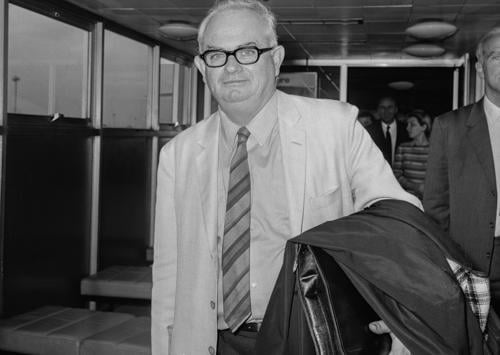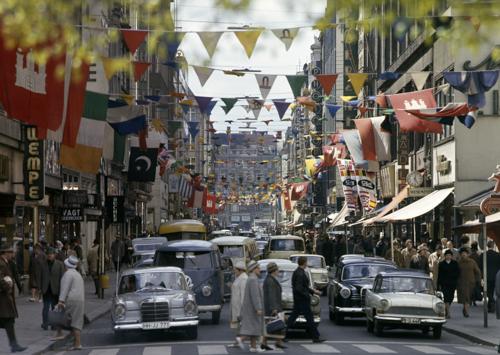Listen to New Voices on Studs Terkel our partnership with 826CHI-here! Read the Story
Showing 1 - 15 of 185 results
-
William Shirer discusses his book “Twentieth Century Journey: 1930-1940: Volume II”
Jun. 1, 1984 Discussing the book "Twentieth century journey: 1930-1940" with the author William Shirer.
-
William Shawcross discusses his book “Sideshow: Kissinger, Nixon and the Destruction of Cambodia”
May. 25, 1979 Investigative journalist William Shawcross speaks with Studs Terkel about Cambodia, Henry Kissinger, and Shawcross’ book, “Sideshow: Kissinger, Nixon and the Destruction of Cambodia.” Both Terkel and Shawcross read excerpts from Shawcross’ book and Terkel reads an excerpt from an interview Henry Kissinger did with reporter Theo Summer.
-
William Hoffman, Jr. reads from and discusses his book "The Loser" ; part 2
1968 With the continuation of this interview, William Hoffman, Jr. talks about his experiences at the race track, his experiences when bouncing checks and his experience having spent one night in jail in Tijuana. With assistance from Gambler's Anonymous, Hoffman, started to write books and turn his life around, to become a winner.
-
William Hoffman, Jr. reads from and discusses his book "The Loser" ; part 1
1968 With this first part of the interview, William Hoffman, Jr. gives some background into his childhood and growing up, as well as some reasons why he felt the need to be successful at gambling.
-
Wilfred Burchett discusses about his career on journalism
Oct. 24, 1977 Wilfred Burchett (an Australian journalist) discusses his journalism career. He was reporting conflicts in Asia (North Korea, Vietnam, China and Japan) and their Communist supporters. He speaks briefly about his experiences in Nazi Germany and concentration camps. Towards the end of the interview he talks about his interest in learning and reporting more about the new euro-communism (prominent in Italy, Spain and France).
-
Vic Banks discusses his latest book "The Pantanal: Brazil's Forgotten Wilderness"
Feb. 19, 1992 Author Vic Banks discusses his travels as a travel photographer and his recent excursion in the UNESCO World Heritage site the Pantanal which is the world’s largest wetland. Banks, highlights troubles facing the wetland including poaching, land development encroachment and mining.
-
Valentin Pluchek and Stanislaw Pchenikov discuss Russian theater, specifically Moscow ; part 1
Jan. 19, 1962 Studs Terkel interviews Valentin Pluchek and Stanislaw Pchenikov on Russia theater, focusing mainly on the city of Moscow.
-
Tom Wicker discusses his book "On Press: A Top Reporters Life In, And Reflection On, American Journalism"
May. 18, 1978 Wicker discusses advocacy journalism versus objective journalism, freedom of the press, and the role of the press in American society.
-
The very "U" girl talks with Studs Terkel ; part 2
1962 Interviewing with the very "u" girl at the establishment (Part 2) while Studs was in England.
-
Sydney J. Harris discusses his book "Pieces of Eight"
Nov. 3, 1982 Journalist and author Sydney J. Harris discusses the essays in his new book "Pieces of Eight." Harris previously wrote for the "Chicago Daily News" and as of the time of this interview, was writing for the "Chicago Sun-Times."
-
Studs Terkel talks with journalist Dieter Strand in Stockholm
Nov. 20, 1973 Journalist Dieter Strand discusses his upbringing in Germany, political apathy and natural characteristics of Swedes. The two also review the urbanization, Protestant work ethic and Strand's writing. Recorded in Stockholm.
-
Studs Terkel talks with Erich Lüth on his first hand experiences living in Hamburg through the rise and fall of Hitler ; part 1
1968 Erich Lüth discusses his experiences, observations, and accounts of life in Hamburg, Germany during the rise and fall of Hitler. He recounts how as a member of Parliament he brought in Hitler's, "Mein Kampf" and read portions aloud and was laughed at by his colleagues. He states they were blind to what Hitler declared in his book he would do and some are still blind by wanting to rub out their past, their history.




